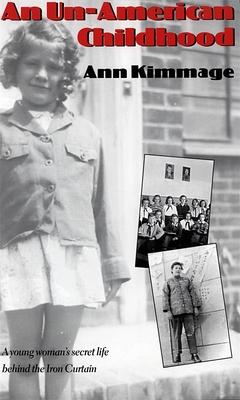An Un-American Childhood is the thoughtful memoir of Ann Kimmage's experiences as a child and young woman in communist Czechoslovakia and China. In 1950, while McCarthyism reigned in America, Kimmage's parents, Abe and Belle Chapman, were active, loyal members of the American Communist Party. Her family lived in Queens, New York, until they were forced underground, illegally fleeing first to Mexico and ultimately Prague, Czechoslovakia, which at the time was in the early stages of its communist revolution. There, the Chapmans became the Capeks--a mystery to their new neighbors, but Czech citizens nonetheless. What Kimmage had at first been led to believe was a brief sojourn became a transforming, thirteen-year journey.
Informative and passionate, An Un-American Childhood provides a unique perspective on the lives of American communist expatriates. Kimmage dramatizes her family's struggle to integrate into a new society and simultaneously maintain their unity and identity. Kimmage and her sister had little choice but to completely adopt Czech language and culture as their own, which created a rift between them and their parents, who were unwilling or unable to do the same. An Un-American Childhood also opens up a personal perspective on the international communist community. Set primarily in Prague, the memoir also recalls a two-year stay in Beijing and visits to such places as East Berlin and Moscow. Kimmage's accounts of her schooling and involvement in social organizations such as the Young Pioneers tell of her exposure to Marxist ideology and morality. However, for her, Kimmage says, life was always less politics than it was culture, language, and relationships. Ending with their disillusioned return to the United States, the Chapman family's saga presents an intriguing mix of political events and personal reactions. An Un-American Childhood tells of a family twice torn from its cultural roots, and tried, tested, and changed by and for its beliefs.
An Un-American Childhood is the thoughtful memoir of Ann Kimmage's experiences as a child and young woman in communist Czechoslovakia and China. In 1950, while McCarthyism reigned in America, Kimmage's parents, Abe and Belle Chapman, were active, loyal members of the American Communist Party. Her family lived in Queens, New York, until they were forced underground, illegally fleeing first to Mexico and ultimately Prague, Czechoslovakia, which at the time was in the early stages of its communist revolution. There, the Chapmans became the Capeks--a mystery to their new neighbors, but Czech citizens nonetheless. What Kimmage had at first been led to believe was a brief sojourn became a transforming, thirteen-year journey.
Informative and passionate, An Un-American Childhood provides a unique perspective on the lives of American communist expatriates. Kimmage dramatizes her family's struggle to integrate into a new society and simultaneously maintain their unity and identity. Kimmage and her sister had little choice but to completely adopt Czech language and culture as their own, which created a rift between them and their parents, who were unwilling or unable to do the same. An Un-American Childhood also opens up a personal perspective on the international communist community. Set primarily in Prague, the memoir also recalls a two-year stay in Beijing and visits to such places as East Berlin and Moscow. Kimmage's accounts of her schooling and involvement in social organizations such as the Young Pioneers tell of her exposure to Marxist ideology and morality. However, for her, Kimmage says, life was always less politics than it was culture, language, and relationships. Ending with their disillusioned return to the United States, the Chapman family's saga presents an intriguing mix of political events and personal reactions. An Un-American Childhood tells of a family twice torn from its cultural roots, and tried, tested, and changed by and for its beliefs.Paperback
$34.96